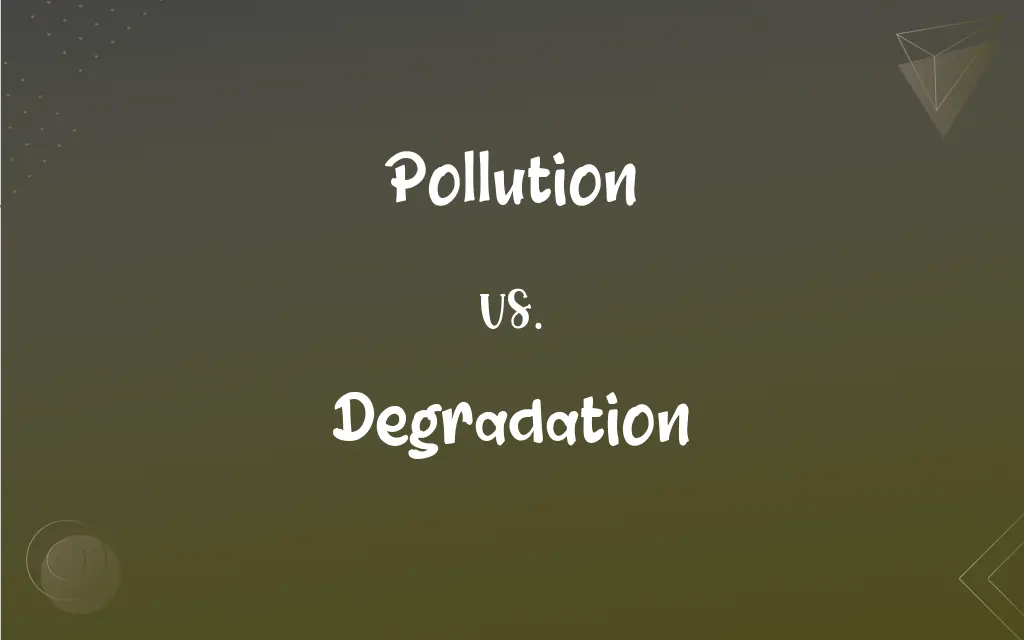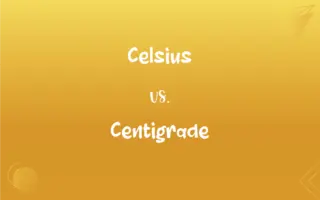Pollution vs. Degradation: What's the Difference?
Edited by Aimie Carlson || By Janet White || Published on December 15, 2023
Pollution is the contamination of the environment with harmful substances, while degradation is the decline in environmental quality due to factors like pollution and deforestation.

Key Differences
Pollution is caused by introducing harmful substances or energies into the environment, like chemicals or noise. Degradation, however, involves a broader decline in environmental quality, often as a result of multiple factors including pollution.
Pollution specifically refers to contamination that disrupts natural processes and harms living organisms. Whereas, degradation encompasses not only pollution but also the depletion of resources, habitat destruction, and a decline in biodiversity.
Certain forms of pollution can be reversible through cleanup and restoration efforts. While, degradation often represents long-term changes to ecosystems, requiring more complex solutions and sustainable management practices.
Regulations targeting pollution typically focus on controlling emissions and waste. Measures to combat degradation include managing land use, protecting habitats, and conserving resources.
Pollution is a key concern in discussions about air and water quality, impacting health and ecosystems. However, degradation is central in broader environmental issues like climate change, deforestation, and desertification.
ADVERTISEMENT
Comparison Chart
Definition
Contamination of the environment with harmful substances
Overall decline in environmental quality
Causes
Emissions, waste discharge, chemicals
Pollution, deforestation, overuse of resources
Impact on Environment
Direct harm to air, water, soil quality
Long-term ecosystem changes, biodiversity loss
Reversibility
Often reversible with intervention
Typically requires extensive restoration
Regulatory and Policy Focus
Controlling contaminants and emissions
Sustainable management, habitat protection
ADVERTISEMENT
Pollution and Degradation Definitions
Pollution
Introduction of harmful substances into the environment.
Industrial waste has led to severe water pollution.
Degradation
Deterioration of ecosystems due to human activity.
Overfishing is causing oceanic degradation.
Pollution
Presence of pollutants in natural settings.
Oil spills cause devastating ocean pollution.
Degradation
Decline in the quality of the natural environment.
Deforestation is leading to the degradation of forests.
Pollution
Contamination that adversely affects nature.
Air pollution in cities is worsening asthma cases.
Degradation
Long-term reduction in the Earth's capacity to support life.
Soil degradation is reducing arable land area.
Pollution
Degradation of air, water, or soil quality due to contaminants.
Soil pollution is affecting agricultural productivity.
Degradation
Degradation of land and natural resources from exploitation.
Excessive mining leads to land degradation.
Pollution
Disruption of ecosystems by hazardous substances.
Chemical pollution is threatening marine life.
Degradation
Reduction in biodiversity and ecosystem health.
Habitat destruction is a major form of ecological degradation.
Pollution
The act or process of polluting or the state of being polluted, especially the contamination of soil, water, or the atmosphere by the discharge of harmful substances.
Degradation
The act or process of degrading.
Pollution
Something that pollutes; a pollutant or a group of pollutants
Pollution in the air reduced the visibility near the airport.
Degradation
The state of being degraded; degeneration.
FAQs
What is environmental pollution?
Introduction of harmful substances into natural environments.
What are common sources of pollution?
Factories, vehicles, and agricultural activities.
How is degradation different from pollution?
Degradation is a broader decline in environmental quality, often including pollution.
Can pollution lead to degradation?
Yes, pollution is a major contributing factor to environmental degradation.
Is air pollution reversible?
Often, through reducing emissions and using cleaner technologies.
What can be done to reverse land degradation?
Sustainable land management and reforestation.
How does land degradation occur?
Through deforestation, soil erosion, and overuse of land.
Can agricultural practices cause degradation?
Yes, especially through overgrazing and improper land use.
What are the health impacts of pollution?
Respiratory issues, allergies, and sometimes chronic diseases.
Are there global policies to reduce pollution?
Yes, like the Paris Agreement and various emission control protocols.
Can degradation affect climate change?
Yes, through factors like deforestation and soil erosion.
How does water pollution affect ecosystems?
Disrupts aquatic life and contaminates water sources.
What are the main types of soil degradation?
Erosion, compaction, and nutrient depletion.
Is noise considered pollution?
Yes, it's a form of environmental contamination.
What are the effects of water degradation?
Loss of aquatic life, reduced water quality, and ecosystem imbalance.
Can individual actions reduce pollution?
Yes, through practices like recycling and reducing emissions.
What is the global impact of degradation?
Affects global ecosystems, food security, and climate patterns.
How does degradation impact biodiversity?
Leads to habitat loss and decline in species diversity.
How does industrial activity contribute to pollution?
Through emissions, waste discharge, and chemical spills.
What role does urbanization play in pollution?
Increases pollution due to higher traffic and industrial activities.
About Author
Written by
Janet WhiteJanet White has been an esteemed writer and blogger for Difference Wiki. Holding a Master's degree in Science and Medical Journalism from the prestigious Boston University, she has consistently demonstrated her expertise and passion for her field. When she's not immersed in her work, Janet relishes her time exercising, delving into a good book, and cherishing moments with friends and family.
Edited by
Aimie CarlsonAimie Carlson, holding a master's degree in English literature, is a fervent English language enthusiast. She lends her writing talents to Difference Wiki, a prominent website that specializes in comparisons, offering readers insightful analyses that both captivate and inform.






































































